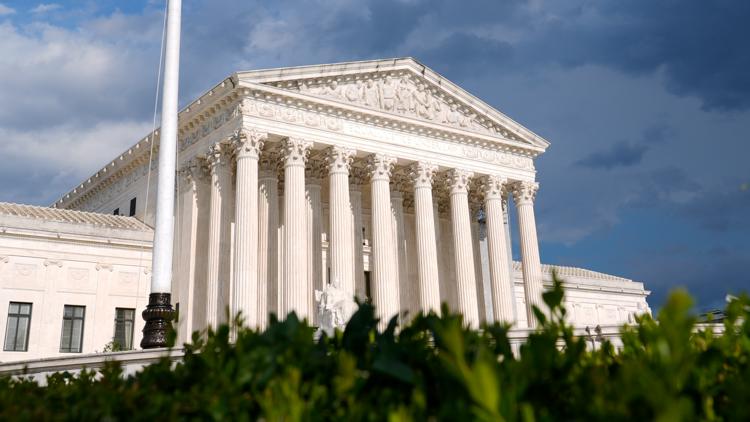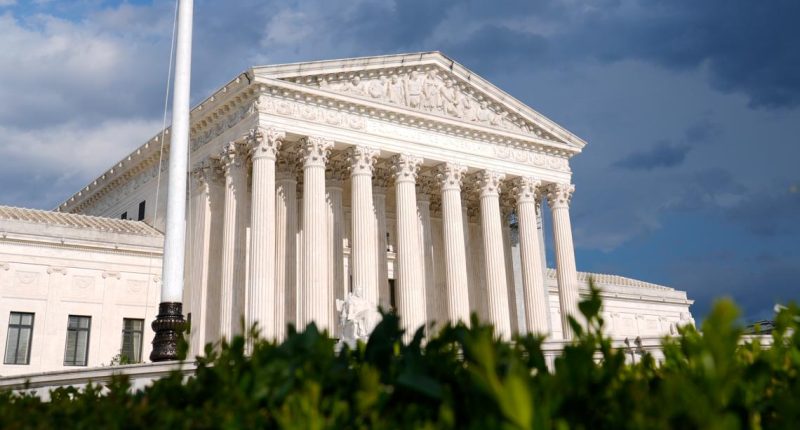Share this @internewscast.com

The court did not explain its reasoning in the brief order, as is typical on its emergency docket.
WASHINGTON — On Friday, the Supreme Court once more allowed the Trump administration to proceed with removing temporary legal safeguards from hundreds of thousands of immigrants, for now raising the number of individuals potentially facing deportation to nearly 1 million.
The justices removed a lower-court ruling that had maintained humanitarian parole protections for over 500,000 migrants from countries including Cuba, Haiti, Nicaragua, and Venezuela. This decision follows a previous court ruling permitting the administration to withdraw temporary legal status from approximately 350,000 Venezuelan migrants in a separate case.
The court did not explain its reasoning in the brief order, as is typical on its emergency docket. Two justices publicly dissented.
The appeal was made to the Supreme Court by the administration on an emergency basis after a federal judge in Boston halted the administration’s efforts to terminate the program. The Justice Department contends that these protections for people escaping conflicts in their countries were always intended to be short-term, and that the Department of Homeland Security retains the authority to annul them without judicial involvement.
Abigail Jackson, a White House spokeswoman, said the Biden-era policies weren’t in line with immigration law. “We are confident in the legality of our actions to protect the American people and look forward to further action from the Supreme Court to vindicate us,” she said.
But Karen Tumlin, founder and director of Justice Action Center, said the decision has “effectively greenlit” deportation orders for a half-million people.
“I cannot overstate how devastating this is,” she said. The court “allowed the Trump Administration to unleash widespread chaos, not just for our clients and class members, but for their families, their workplaces, and their communities.”
Republican President Donald Trump promised on the campaign trail to deport millions of people, and in office has sought to dismantle Biden administration polices that expanded paths for migrants to live legally in the U.S. In a 2024 presidential debate, Trump amplified false rumors that Haitian immigrants in Ohio, including those with legal status under the humanitarian parole program, were abducting and eating pets, court documents note.
Justice Ketanji Brown Jackson wrote in dissent to Friday’s ruling that the effect of the high court’s order is “to have the lives of half a million migrants unravel all around us before the courts decide their legal claims.” Justice Sonia Sotomayor joined the dissent.
Jackson echoed what U.S. District Judge Indira Talwani wrote in ruling that ending the legal protections early would leave people with a stark choice: flee the country or risk losing everything. Her ruling came in mid-April, shortly before permits were due to be canceled. An appeals court refused to lift it.
The Supreme Court’s order is not a final ruling, but it means the protections will not be in place while the case proceeds. It now returns to the 1st U.S. Circuit Court of Appeals in Boston.
Talwani, an appointee of Democratic President Barack Obama, did allow the Trump administration to revoke parole, but on a case-by-case basis.
But the Trump administration argued the parole was granted en masse, and the law doesn’t require ending it on an individual basis. Taking on each case individually would be a “gargantuan task,” and slow the government’s efforts to press for their removal, Solicitor General D. John Sauer argued.
Joe Biden used humanitarian parole more than any other president, employing a special presidential authority in effect since 1952.
Beneficiaries included the 532,000 people who have come to the United States with financial sponsors since late 2022, leaving home countries fraught with “instability, dangers and deprivations,” as attorneys for the migrants said. They had to fly to the U.S. at their own expense and have a financial sponsor to qualify for the designation, which lasts for two years.
The Trump administration’s decision was the first-ever mass revocation of humanitarian parole, attorneys for the migrants said. They called the Trump administration’s moves “the largest mass illegalization event in modern American history.”
The case is the latest in a string of emergency appeals the administration has made to the Supreme Court, many of them related to immigration.
The court has sided against Trump in other cases, including slowing his efforts to swiftly deport Venezuelans accused of being gang members to a prison in El Salvador under an 18th century wartime law called the Alien Enemies Act.
Copyright 2025 Associated Press. All rights reserved. This material may not be published, broadcast, rewritten, or redistributed.

















